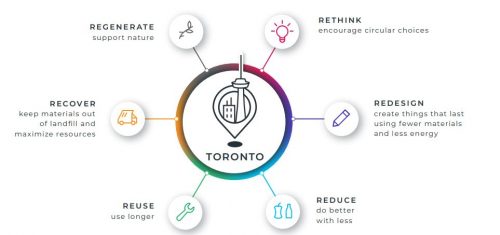The City is working towards an aspirational goal of zero waste and a circular economy. The circular economy aims to reduce waste and maximize resources by moving away from the linear take-make-and-dispose approach to a more circular system that focuses on product longevity, renewability, reuse and repair as well as resource recovery. Transitioning to a circular economy will play a key role in building a resilient, inclusive, green, and prosperous future for Toronto residents and businesses.
Instead of taking from the planet, a circular economy approach challenges us to be a part of it by:
- taking less
- using better
- making sure our economies and our choices support the natural environment we rely on.
Everyone has a role to play in the circular economy!
Circular Economy Principles

Circular Economy E-Updates
To receive information and updates related to sustainable consumption and circular economy initiatives and opportunities, subscribe to Circular Economy E-Updates.

